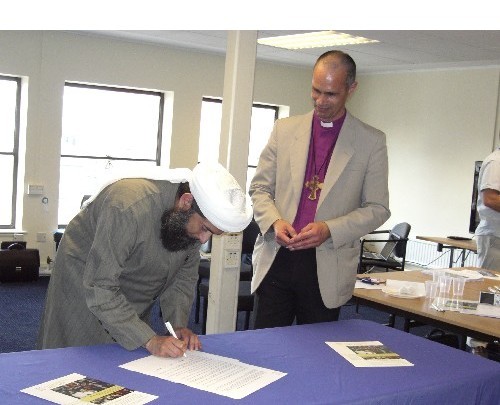I’m preparing to lead a retreat for members of a multi-faith University chaplaincy team, using hospitality as an entry point for personal and group reflection. I’ll be drawing on Geoff Boyce’s newly published book, An Improbable Feast – the surprising dynamic of hospitality at the heart of multifaith chaplaincy. Also I’ll be drawing on insights represented in “Ethical Guidelines for Witness”, a useful paper put out in 2009 by the Christian Muslim Forum in the UK. Read on for the ten agreements, and eleven similar statements on the same theme.

As members of the Christian Muslim Forum we are deeply committed to our own faiths (Christianity and Islam) and wish to bear faithful witness to them. As Christians and Muslims we are committed to working together for the common good. We recognise that both communities actively invite others to share their faith and acknowledge that all faiths have the same right to share their faith with others.
There are diverse attitudes and approaches amongst us which can be controversial and raise questions. This paper is not a theology of Christian evangelism or mission or Da’wah (invitation to Islam), rather it offers guidelines for good practice.
The Christian Muslim Forum offers the following suggestions that, we hope, will equip Christians and Muslims (and others) to share their faith with integrity and compassion for those they meet.
- We bear witness to, and proclaim our faith not only through words but through our attitudes, actions and lifestyles.
- We cannot convert people, only God can do that. In our language and methods we should recognise that people’s choice of faith is primarily a matter between themselves and God.
- Sharing our faith should never be coercive; this is especially important when working with children, young people and vulnerable adults. Everyone should have the choice to accept or reject the message we proclaim and we will accept people’s choices without resentment.
- Whilst we might care for people in need or who are facing personal crises, we should never manipulate these situations in order to gain a convert.
- An invitation to convert should never be linked with financial, material or other inducements. It should be a decision of the heart and mind alone.
- We will speak of our faith without demeaning or ridiculing the faiths of others.
- We will speak clearly and honestly about our faith, even when that is uncomfortable or controversial.
- We will be honest about our motivations for activities and we will inform people when events will include the sharing of faith.
- Whilst recognising that either community will naturally rejoice with and support those who have chosen to join them, we will be sensitive to the loss that others may feel.
- Whilst we may feel hurt when someone we know and love chooses to leave our faith, we will respect their decision and will not force them to stay or harass them afterwards.
Eleven Similar Statements
- Striving Together in Dialogue, WCC, Muslims and Christians, The Netherlands, 2000.
- “Joint declaration on the freedom of religion and the right to conversion“, Islamic Council of Norway/Church of Norway Council on Ecumenical and International Relations, 2007
- Being a citizen of Europe and a person of faith, Committee for Relations with Muslims in Europe/Conference of European Churches and Muslim representatives, 2008
- Building Good Relations with People of Other Faiths and Beliefs, Inter Faith Network, 1993.
- A code of good practice for relations with people of all faiths and none, UK Hindu Christian Forum, 2005
- Report from inter-religious consultation on “Conversion – assessing the reality” WCC, 2006
- A call to adopt responsible relationships in mission and to renounce proselytism, WCC, 1997.
- Ecumenical considerations for dialogue and relations with people of other religions, WCC, 2004.
- Generous Love: the truth of the Gospel and the call to dialogue, an Anglican theology of inter faith relations, 2008
- Gracious Christian Responses to Muslims in Britain Today, 2008. A set of Christian principles to help inform our relationships with Muslims. Global Connections, Birmingham
- Muslim
- A Common Word, 138 worldwide Muslim scholars of many traditions, 2007.

Great stuff Duncan – and not just because you’re using my book!
Btw you probably know it’s being launched in Sydney on Wednesday.
Let me know if you would like me to leave a few copies there for your retreat.
And I look forward to hearing how the retreat went and particularly any feedback (either way) about the book.
Geoff